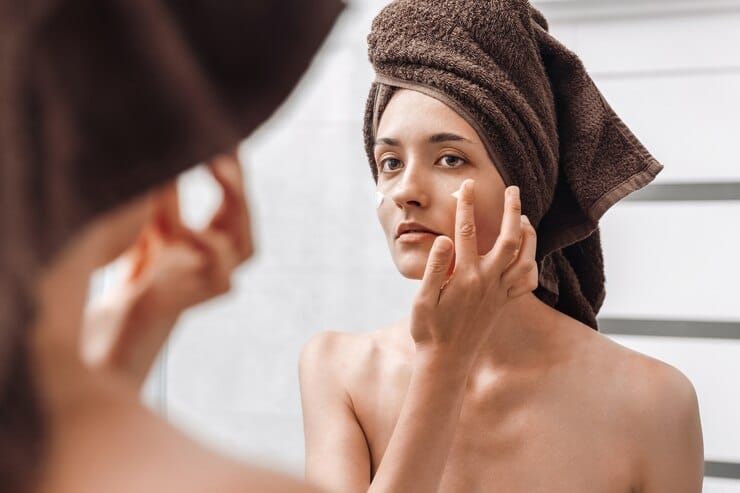Understanding dry skin can be a real game-changer in your skincare journey. It’s not just about the discomfort or the appearance; it’s about giving your skin the love and care it needs. Let’s dive into how we can tackle this with the right products.
Identifying Dry Skin

Symptoms of dry skin
Dry skin and dead skin can feel tight, rough, and sometimes itchy. You might notice flakiness, redness, and even cracks. These signs are your skin’s way of asking for some serious hydration.
Causes of Dry Skin
Dry skin can be caused by various factors, including genetics, environmental conditions, and lifestyle choices. Harsh weather, hot showers, and certain skincare products can strip your skin of its natural oils, leaving it parched.
Essential Skincare Routine for Dry Skin

Cleansing
Proper cleansing is the foundation of any skincare routine, especially for dry skin.
Gentle Cleansers
Opt for a gentle, sulfate-free cleanser that won’t strip your skin of its natural oils. Look for ingredients like glycerin and hyaluronic acid to help maintain moisture.
Cleansing Oils
Cleansing oils are fantastic for dry skin. They help dissolve makeup and impurities without drying out your skin. Plus, they leave your skin feeling soft and hydrated.
Exfoliating
Exfoliating helps remove dead skin cells, allowing your moisturizers to penetrate better.
Frequency of Exfoliation
For dry skin, exfoliating once or twice a week is sufficient. Over-exfoliating can lead to irritation and more dryness.
The Best Exfoliants for Dry Skin
Look for gentle exfoliants like lactic acid or fruit enzymes. These ingredients help to exfoliate without being too harsh.
Moisturizing Dry Skin

Moisturizing is crucial for maintaining hydrated, healthy skin.
Types of Moisturizers
Creams vs. lotions vs. ointments
Creams are thicker and more hydrating, making them ideal for dry skin. Lotions are lighter and better for mild dryness. Ointments are the heaviest and best for extremely dry or cracked skin.
Ingredients to Look For
Hyaluronic Acid
This superstar ingredient can hold up to 1,000 times its weight in water, making it perfect for deep hydration.
Ceramides
Ceramides help restore the skin barrier and lock in moisture, which is essential for keeping dry skin healthy.
Glycerin
Glycerin attracts moisture to the skin, keeping it hydrated and smooth.
Additional Skincare Products

Serums
Hydrating Serums
Look for serums with hyaluronic acid or glycerin for an extra boost of hydration.
Antioxidant Serums
Antioxidants like vitamin E can help protect your skin from environmental damage while providing some hydration.
Face Masks
Hydrating Masks
Use hydrating masks once or twice a week to give your skin a moisture surge. Look for masks with ingredients like aloe vera and honey.
Overnight Masks
Overnight masks can work wonders while you sleep, providing deep hydration and leaving your skin soft and plump by morning.
Facial Oils
Benefits of Facial Oils
Facial oils can help seal in moisture and provide a protective barrier. They are great for adding a healthy glow to dry skin.
The Best Oils for Dry Skin
Oils like jojoba, argan, and rosehip are excellent for dry skin. They nourish and hydrate without clogging pores.
Body Care for Dry Skin

Body Washes
Hydrating Body Washes
Choose a body wash that is free from harsh detergents and filled with moisturizing ingredients like shea butter and glycerin.
Body Lotions and Creams
Deeply moisturizing body lotions
Opt for lotions and creams that contain rich emollients like cocoa butter and ceramides to keep your body’s skin soft and supple.
Hand and foot creams
Intensive Care for Hands and Feet
Our hands and feet often need extra care. Look for creams specifically designed to provide intense moisture to these areas.
Sunscreen for Dry Skin

The importance of sunscreen
Sun protection is crucial for all skin types, but it’s especially important for dry skin to prevent further damage and dryness.
The Best Sunscreens for Dry Skin
Choose sunscreens that have hydrating ingredients and are formulated for dry skin. Look for terms like “moisturizing” or “hydrating” on the label.
Lifestyle Tips to Combat Dry Skin

Hydration
Drinking plenty of water is fundamental. Hydrated skin starts from within.
Diet
Include foods rich in omega-3 fatty acids, like fish and flaxseed, to help maintain your skin’s moisture barrier.
Humidifiers
Using a humidifier can add moisture to the air, helping to keep your skin hydrated, especially during dry seasons.
Avoiding hot showers
Hot water can strip your skin of its natural oils. Opt for lukewarm showers and limit your bathing time.
Conclusion
Caring for dry skin involves a combination of the right products and a consistent skincare routine. By choosing gentle cleansers, hydrating moisturizers, and nourishing serums, you can keep your skin soft, supple, and glowing. Remember, everyone’s skin is different, so it’s important to personalize your routine to meet your specific needs.
FAQs
What is the best moisturizer for extremely dry skin?
For extremely dry skin, look for a thick cream or ointment that contains ingredients like ceramides, hyaluronic acid, and glycerin. These ingredients help to lock in moisture and restore the skin barrier.
Can oily skin become dry?
Yes, oily skin can become dry due to various factors, such as harsh skincare products, environmental changes, and over-cleansing. It’s important to balance your skincare routine to address both oiliness and dryness.
How often should I exfoliate my dry skin?
For dry skin, exfoliating once or twice a week is sufficient. Over-exfoliating can lead to irritation and increased dryness, so it’s best to be gentle.
Are natural oils good for dry skin?
Natural oils like jojoba, argan, and rosehip are excellent for dry skin. They provide nourishment and hydration without clogging pores.
Can diet affect dry skin?
Yes, diet can significantly affect your skin’s health. Eating foods rich in omega-3 fatty acids, vitamins, and antioxidants can help maintain your skin’s moisture barrier and overall health.







